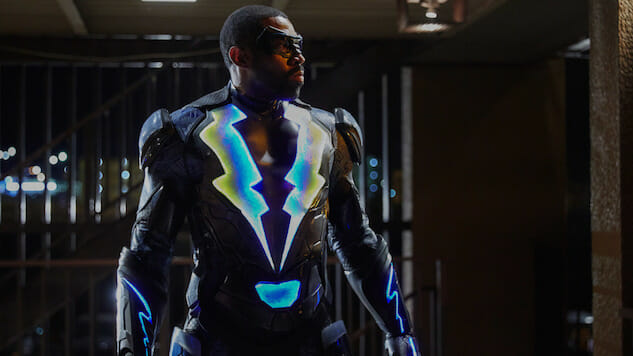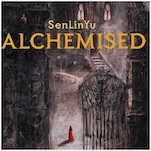DC Comics’ Landmark DC in D.C. Event Proves It’s Our World—Superheroes Are Just Living in It
Photos: Courtesy of The CW
Two notable events took place on Pennsylvania Avenue on Saturday, January 13: Down nearer the White House, Trump International Hotel saw the president’s (most recent) racist comments projected across its entrance by a local multimedia artist-activist, while up nearer the Capitol, the Newseum hosted DC in D.C. 2018, an all-day panel event put on by DC Comics and Warner Bros. Television as part of the CW’s rollout of its newest—and most relevant and race-aware—superhero series, Black Lightning.
The Newseum is six stories tall. A solid slab of rock carved, not projected, with the 45 words of the First Amendment takes up four of them on the building’s face. Inside is a piece of the Berlin Wall, a sobering room full of Pulitzer Prize-winning photographs and a gallery commemorating the 50-year anniversary of the civil rights movement’s most explosively “tumultuous” year.
You don’t organize a pop culture event in the nation’s capital, at the Newseum, on MLK weekend 2018, if you want it to be only a pop culture event.
Similarly, you don’t greenlight a superhero series like Black Lightning, featuring not just the first black superhero to lead a DC live-action series, but one of DC’s most iconic black families, if you want it to be only another superhero series.
That DC Comics and Warner Bros. Television did both, stacking the Newseum event with panels on black, female, LGBTQ+ and PTSD representation in superhero stories generally and clearing the way for showrunner Salim Akil’s sweeping, status quo-shattering vision on Black Lightning specifically, is evidence of their commitment to challenging themselves to be at the vanguard of inclusive on-screen representation.
This trend towards richly drawn, consistent inclusivity on the DC small screen isn’t new. Starting with the revelation of Sara Lance’s (Caity Lotz) relationship with Nyssa al Ghul (Katrina Law) in the second season of Arrow, LGBT representation has gradually, unapologetically seeped through the rest of the Arrowverse (most notably on Supergirl and in CW Seed’s newest hero-launcher, Freedom Fighters: The Ray) and over into Gotham (the Penguin!). And while there is still a marked and seemingly intractable gender imbalance on all of DC’s shows, save for the increasingly lady-saturated Supergirl, DC’s female characters are at least universally valued for their skill, intelligence and grit rather than for their sex appeal. While Mister Miracle’s PTSD-focused story has yet to make it to a screen, major characters in the DC series that are currently airing have spent time living with and examining the cost of violence in ways that Marvel’s otherwise enthralling cinematic universe hasn’t. There is, still and always, progress to be made, but at least female, LGBT and PTSD-afflicted viewers have had several years to get used to seeing even a fraction of their inner selves more deeply respected and complexly reflected on screen.
When it comes to race, however, well—beyond the initially provocative recasting of the West family (including Iris and Kid Flash) as black on The Flash, even the most rudimentary progress has yet to be made in any realistic, nuanced way.
Enter Black Lightning, a.k.a. Garfield High School principal Jefferson Pierce, the focus of showrunner Salim Akil’s singular vision for what a superhero story in 2018 could and should be.
“It was very important to us, in our storytelling,” Black Lightning executive producer (and Akil’s wife) Mara Brock Akil explained during one of Saturday’s round tables, “to put the black man at the center of the story, especially at the time we were developing it [in May 2016]. Not to dismiss black women, because heaven knows, we have our own issues—but the talk at the time was all about what was happening to black men, especially with police brutality, gang violence. It was affecting them at a higher rate, and yet there was no fictitious character on television responding to that in any way. And that was important to us to get that in there.”
This idea, of the importance of getting superheroic characters on superheroic television to respond to something happening in the real world—a cultural movement, a sexual identity, trauma—was echoed throughout the day, across every panel and in every round table discussion. American Crime creator and 12 Years a Slave writer/producer John Ridley took pains to sidestep his own work in order to express how earth-shattering Black Lightning’s premiere is going to be, recalling his own memory of pulling Black Lightning Vol. 1 from his brown paper comic book day bag back when he was 10 years old:
“I think a lot of you will not have that feeling, of pulling something out of a bag and being so stunned by it,” Ridley said. “We have this run-up, and we have this publicity, and it’s all great, but to have lived long enough where it’s not pulling the surprise out of the bag, but it’s being presented to all of us as entertainment, mainstream entertainment, network entertainment, is amazing. Some of you will never experience that surprise of, somebody actually did this… somebody actually heard me, that, these are great, but I wish one of these characters actually looked like me, or as an extension, certainly, was a similar gender, a different gender, a different orientation, an orientation outside of my own. I don’t know if people realize how remarkable it is what everybody up here has done.”
Milestone Media co-founder and black comic book legend Denys Cowan echoed Ridley’s sentiments: “I think it’s amazing that we’re living in a time now when all this stuff is happening. I see the ads for Black Lightning on television and I about lose my mind! Because I’ve never seen anything like this before. I mean, not live-action, black superheroes, where they weren’t making fun of you. Where they weren’t making fun of you! I’m amazed. And the fact that there are black people behind it? That’s even more amazing.”
“You create a character that people can identify with,” Akil explained, both to expand on his goals with Jefferson Pierce as representative of great black men and to downplay the stress on Pierce’s blackness as the be-all, end-all of the character. “You create a character that has a certain degree of what people like to call authenticity. Oftentimes, people use that word when they’re talking about another culture, but really what we’re talking about is the nuances of humanity, right? So you create a character that people recognize and can have fun with, so you bring them into it in a way that is also real, so when you see the show, not only will you recognize the character, you will recognize the world and you will recognize the issues that are in the show.”
This balance, between what notes of humanity will be universally recognizable to an audience and what notes of authenticity will be specifically recognized and appreciated by underserved or marginalized audiences, was a key that the writers, artists, actors and producers in the other panels all also hit on.
“I think that the power of stories, like what you’re telling—the power of entertainment more broadly—is it can start and advance conversations in very different ways than traditional books can, and you can tell stories that change our narratives around emotions,” former Surgeon General Dr. Vivek Murthy said, musing on the power of former CIA officer Tom King’s takes on trauma in Grayson and Mister Miracle. “And when it comes to how PTSD is portrayed, I think it can be very helpful when it is portrayed in a real way, with complexities, with the lack of answers that we sometimes have, with the stories of what actually help, like the people in our lives who, through the power of their love and compassion and presence can often heal us in ways that are more profound than in a medical setting.”
“The push for me,” Midnighter and Supergirl comic writer Steve Orlando explained in the Pride of DC panel, “is reflecting the world around us, and that means having enough representation that the characters don’t have to be the be-all and end-all for their community, [that] they’re allowed to be imperfect and they’re allowed to be more richly layered and real.”
Bombshells writer Marguerite Bennett and the Arrowverse’s plate-spinning EP, Greg Berlanti, agreed that the key to getting to eventually play with all the nuances of humanity a non-white, non-cis, non-het, non-male character could embody will be just, in general, getting more of everything non-default onto our pages and screens.
“I think it’s just more, more, MORE,” Bennett said, “so that each queer relationship doesn’t have to stand in for all queer relationships, each queer character won’t have to speak to every experience. I guess the finish line in my brain is when it gets to the point that, you know, cis, het, white, male is no longer the default, is no longer like, well WHY is this character a woman? Why does this character have to be queer? Why does this character have to be black? Where it’s no longer that you have to argue, well, it’s because people exist. I mean, I feel like that’s a pretty basic answer.”
“I think the more free we are to sort of create and bring our passion to it, [the better],” Berlanti agreed, “but that time’s not yet. And that’s why representation matters more than ever, I think.”

That that time is yet to fully come was the source of both great frustration and joy over in the Wonder Women panel, too, which featured three actresses each from the Arrowverse and Gotham (Candice Patton, Caity Lotz, Danielle Panabaker, Camren Bicondova, Erin Richards, and Jessica Lucas) as well as comics writers Shea Fontana, Julie Benson, Shawna Benson, Mariko Tamaki, and Agnes Garbowska and Berlanti Productions President Sarah Schechter. The importance of women supporting women—not just emotionally, but professionally, on set, in front of and behind the camera, in and out of salary negotiations, in every way that would be entirely unremarkable were anything close to gender parity to exist in television—informed the entire hour.
“It’s listening, it’s communicating, but it’s also [just] basic stuff,” Schechter said, after describing how useful it is to just listen to the actresses (and actors) who know their characters best. “Like, my whole career I’ve been like, why did the woman character walk in the room if she’s not going to say anything? and then guys will be like Ohhhhhh. Sometimes you gotta just keep challenging.”
On the Gotham set, Richards and Lucas noted, their opinions about and (dis)comfort with their characters’ costumes and relative degrees of undress are always welcomed and enthusiastically responded to. “There was a scene in which Jessica and I were supposed to torture a man in our underwear,” Richards explained (“As one does!” Fontana joked), “and we had one of the executive producers call us and say, this scene is coming up, how do you feel? and we were like, we don’t want to do that. And they were like, absolutely fine. They were absolutely fine with us saying no. And to be given that choice was a really wonderful thing.”
“And I think that’s important, again,” Patton followed up, “why it’s so important to have women and diverse people in the room. To have a second person in that costume fitting, to have a producer that’s a woman who says, I got your back—you don’t want to wear that? You don’t have to wear that. You don’t want to say that? You don’t have to say that.”
Accordingly, having Emily Bett Rickards with her on set as a female scene partner for Iris and Felicity’s non-powered side adventure during this season’s four-part crossover miniseries event, Crisis on Earth-X, was a revelation. “Four years, four seasons, and we’re still the only two female season regulars,” Patton and Panabaker noted with palpable frustration during the round tables. “They bring in men every year, but they have yet to bring in enough women.” And their two characters, Iris West and Caitlin Snow, hardly spend any real plot time together one-on-one. Working with Rickards gave Patton a taste of what that kind of emotional and professional camaraderie could be like, and the drive to get her and Panabaker in more and better arcs together in the future.
Over on her own series, Lotz now has two female colleagues—but that is out of an even bigger main cast; she, too, is wistful for a future in which the Waverider is overrun with ladies. “I’d love to see the gender ratio of on-screen characters become a little bit more even. Like, could you imagine Legends of Tomorrow where it was like, mostly women and two men? It’d be like, what show is this?” (Panabaker: “It’d be a GREAT show.”) “Like, I can’t even conceptualize it! Why is that so weird, why does it have to always be The One? We have three now, but we’re still outnumbered. I’d love to see that change.”
“We could also stand to overcorrect,” Panabaker agrees, following my question as to what other parameters they might want to add to an updated Bechdel-Wallace Test. “Give women a chance to see if maybe women could do it better.”
“I think for me, you know, if you have black actors on a show, you need black writers in the writers room, you need black directors on set, or a Hispanic director if you have Hispanic characters on a show. You need those voices in the writers room to do a character justice. I always joke about this with Jesse [Ferguson, who plays Iris’ dad] on set: Grandma Esther’s noodles?? Black people don’t make noodles! It would be Grandma Esther’s sweet potato pie, you know what I mean? For me, it’s just like, if you’re going to have a diverse group of actors, a diverse group of characters, it’s really important to then have that represented in the writers room and in the director’s chair.”
Gotham’s J.W. Cortes, a 13-year Marine combat veteran, spoke to the practical benefits of this sentiment when describing an episode he did of Night Shift, on the set of which 70% of the cast and crew telling that story about veterans were veterans themselves, “telling our stories. Representation matters.”
Which is what makes Tuesday’s premiere of Black Lightning so incredibly (excuse the pun) electrifying: It is black producers, black writers, black actors, all coming together to tell a the story of Jefferson Pierce, nuanced black man, black father, black hero, in a nuanced black family, with a nuanced black community.
As Chris Chalk said about playing a young Lucius Fox on Gotham, hopefully giving Cress Williams and the rest of the young cast members on Black Lightning some idea of what kind of fan interactions are in their future, “The best part about it is, it’s same thing everyone is saying: You see yourself. I’ve got these kids who come up to me, like, I did a STEM project thing, and these little scientists come up and they’re like, oh my gosh, I know how Lucius made this, and I’m like, DO TELL! Because I don’t! And so it’s like this accidental activism of being this brown person on television who’s the smartest person in the room, who doesn’t fight anybody, who is kind and is the most empathetic character on the show, is the awesome little thing that I didn’t know was going to be the gem of this gig.”
“And then it’s this wonderful thing where these kids do come up, like, on the train in Brooklyn, people be like, yo son! I really like the way you did that math problem!” Chalk continued. “But it’s so important to hear it from that voice, to hear the voice that we traditionally hear saying, yo, son, I got a gun, I’m hearing cats on the streets of Brooklyn talking about yeah I like that [math], and I like that suit, too! You know what I mean? And it’s this important thing to see ourselves in so many different lights, as so many different types of heroes.”
Of course, however much progress has been made, there could always be more. Towards the end of the day, at the tail end of the Pride of DC panel, an audience member came up to the microphone with the goal to challenge an already striving DC to lift its brand to even greater heights: “My question is about today in particular. The last three panels that we’ve had have contained really relevant conversations, but they’ve separated out identities in a way that doesn’t really reflect our lived experiences. So, I was wondering if you all had advice on how we as an audience can demand representation that reflects and normalizes the intersection of our identities.”
The panelists’ answer? Buy the books and watch the shows that are already telling whatever sliver of those stories you can find, and push DC forward with the value of your eyeballs. DC has hired the creators who are hungry to create these stories; they just need audiences to welcome them into canon.
“They are working in the tradition of W. E. B. Du Bois,” said comic book writer Alice Randall. “He understood that children’s literature that is cross-written to adults would inform the politics of the future. And I think these actors and writers and producers are helping create the text that will make sure actually our reality is better in the future.”
Black Lightning premieres Tuesday, Jan. 16 at 9 p.m. on The CW. The full video of all the DC in D.C. 2018 panels is streaming on YouTube.
Alexis Gunderson is a TV critic whose writing has appeared on Forever Young Adult, Screener, and Birth.Movies.Death. She’ll go ten rounds fighting for teens and intelligently executed genre fare to be taken seriously by pop culture. She can be found @AlexisKG.







































